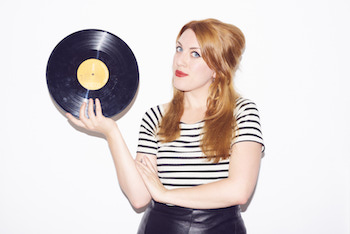
Leonie Cooper. Photo by Bella Howard.
Leonie Cooper used to send reviews of every gig she attended to NME, until they published them. That was fourteen years ago, and now she’s a senior staff writer at one of the UK’s biggest new music magazines, online and in print.
Some things are just meant to be. “I don’t ever remember taking an active decision to work in music journalism,” says Leonie, “but things just kind of wonderfully fell into place.” From starting up a sixth form newspaper, to undertaking a number of work experience placements and internships, Leonie notes that “by staying in contact with people at those titles, [she] got small bits of work, which, after a time, became bigger bits of work and so on.”
Her role at NME seemed inevitable as even when freelancing, “NME has always felt like home.” Commenting on the changes the magazine has made with the industries, with it becoming a free publication; “it’s been a very exciting time‚” seeing things change, and seeing the magazine hit an all-time readership high.
“In a world where magazines are struggling, to be working at NME when it’s at the peak of its powers is quite an amazing feeling.”
Leonie’s weekly ‘On The Record’ column is quick-witted, opinionated and fun, showcasing Leonie’s established and loud voice. In finding that voice, she advises new journalists; “it’s important to develop your own style of writing, but I think to do that you have to understand how other people write. So before you start writing yourself, reading is the most important thing you can do.” Not just journalism, but fiction, fantasy and poetry “all feeds in” as “the more influences you have, the fresher your own work will be.”
Like with any creative industries, even if you have your voice and a portfolio of work, it can be difficult to get that foot in the door. The writer advises, “Go to all the gigs. Listen to all the music. Find a niche. Find the scene that no-one else knows about and learn everything about it. Become the only person who’s able to write about the tiny scene that no-one else knows about.”
By being open-minded in what you were about, and pitching your insider knowledge to editors you should tell them why you’re the only person to write about it. “Make yourself invaluable.”
In 2010 it was reported that 66% of people working behind the scenes in music are male, and in London, women represent only 30%. With this, 47% of women who work within music earn less than ~£10,000, compared with 35% of men. In journalism particularly, a 2013 study by Women in Journalism, found that in British national newspapers, 78% of front-page articles were written by men, and that men accounted for 84% of all people mentioned or quoted in those lead pieces.
But for Leonie, “the problem is deeper than just one specific industry‚ but working in a patriarchal society seems to mean that women are hitting glass ceilings all over the place.” She notes however that if women are interested in a job in a music industry they “should approach it the same way as you need to approach working in any kind of competitive industry, with heaps of enthusiasm.”
The road to publication is a rocky one, so “don’t be afraid of being knocked back. These things don’t happen immediately.” Payment wise too, it’s highly likely that “you’ll have to work for free for a bit, which sucks, but that’s just the way things are. Be prepared to be pretty miserable for it. Be prepared to be pretty skint for a bit.”
“But try not to give up, because that’s when someone else will step in!”
-Tanyel Gumushan
Take-Over Blogger
Alternative Girl
